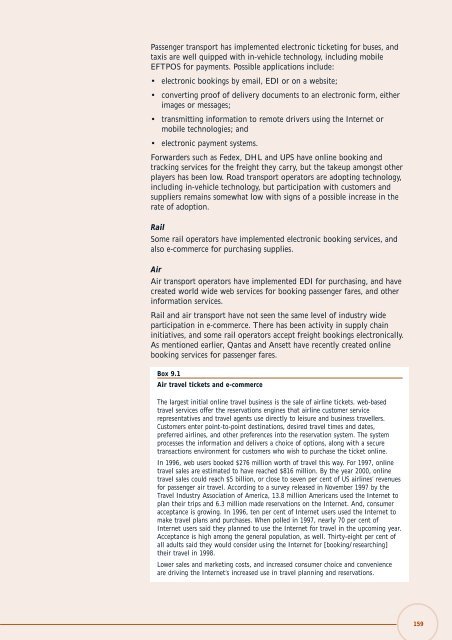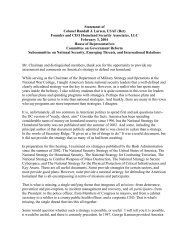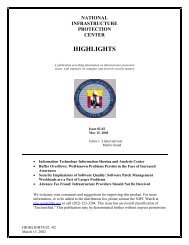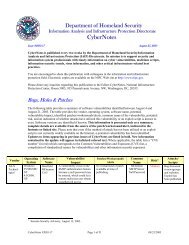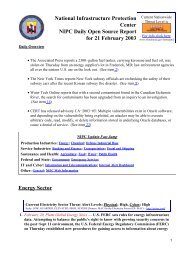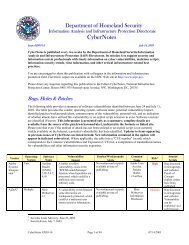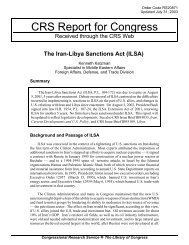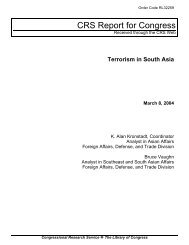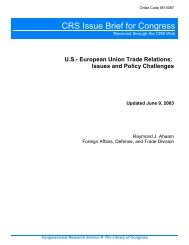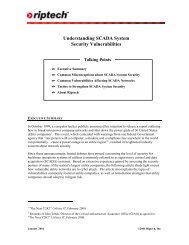beyond pt 0 23/1
beyond pt 0 23/1
beyond pt 0 23/1
You also want an ePaper? Increase the reach of your titles
YUMPU automatically turns print PDFs into web optimized ePapers that Google loves.
Passenger transport has implemented electronic ticketing for buses, and<br />
taxis are well quipped with in-vehicle technology, including mobile<br />
EFTPOS for payments. Possible applications include:<br />
• electronic bookings by email, EDI or on a website;<br />
• converting proof of delivery documents to an electronic form, either<br />
images or messages;<br />
• transmitting information to remote drivers using the Internet or<br />
mobile technologies; and<br />
• electronic payment systems.<br />
Forwarders such as Fedex, DHL and UPS have online booking and<br />
tracking services for the freight they carry, but the takeup amongst other<br />
players has been low. Road transport operators are ado<strong>pt</strong>ing technology,<br />
including in-vehicle technology, but participation with customers and<br />
suppliers remains somewhat low with signs of a possible increase in the<br />
rate of ado<strong>pt</strong>ion.<br />
Rail<br />
Some rail operators have implemented electronic booking services, and<br />
also e-commerce for purchasing supplies.<br />
Air<br />
Air transport operators have implemented EDI for purchasing, and have<br />
created world wide web services for booking passenger fares, and other<br />
information services.<br />
Rail and air transport have not seen the same level of industry wide<br />
participation in e-commerce. There has been activity in supply chain<br />
initiatives, and some rail operators acce<strong>pt</strong> freight bookings electronically.<br />
As mentioned earlier, Qantas and Ansett have recently created online<br />
booking services for passenger fares.<br />
Box 9.1<br />
Air travel tickets and e-commerce<br />
The largest initial online travel business is the sale of airline tickets. web-based<br />
travel services offer the reservations engines that airline customer service<br />
representatives and travel agents use directly to leisure and business travellers.<br />
Customers enter point-to-point destinations, desired travel times and dates,<br />
preferred airlines, and other preferences into the reservation system. The system<br />
processes the information and delivers a choice of o<strong>pt</strong>ions, along with a secure<br />
transactions environment for customers who wish to purchase the ticket online.<br />
In 1996, web users booked $276 million worth of travel this way. For 1997, online<br />
travel sales are estimated to have reached $816 million. By the year 2000, online<br />
travel sales could reach $5 billion, or close to seven per cent of US airlines’ revenues<br />
for passenger air travel. According to a survey released in November 1997 by the<br />
Travel Industry Association of America, 13.8 million Americans used the Internet to<br />
plan their trips and 6.3 million made reservations on the Internet. And, consumer<br />
acce<strong>pt</strong>ance is growing. In 1996, ten per cent of Internet users used the Internet to<br />
make travel plans and purchases. When polled in 1997, nearly 70 per cent of<br />
Internet users said they planned to use the Internet for travel in the upcoming year.<br />
Acce<strong>pt</strong>ance is high among the general population, as well. Thirty-eight per cent of<br />
all adults said they would consider using the Internet for [booking/researching]<br />
their travel in 1998.<br />
Lower sales and marketing costs, and increased consumer choice and convenience<br />
are driving the Internet’s increased use in travel planning and reservations.<br />
159


